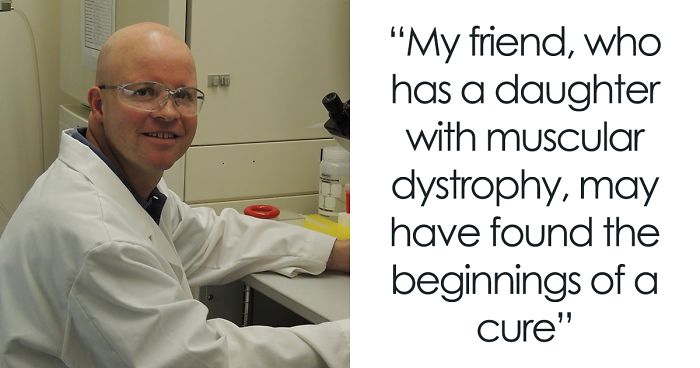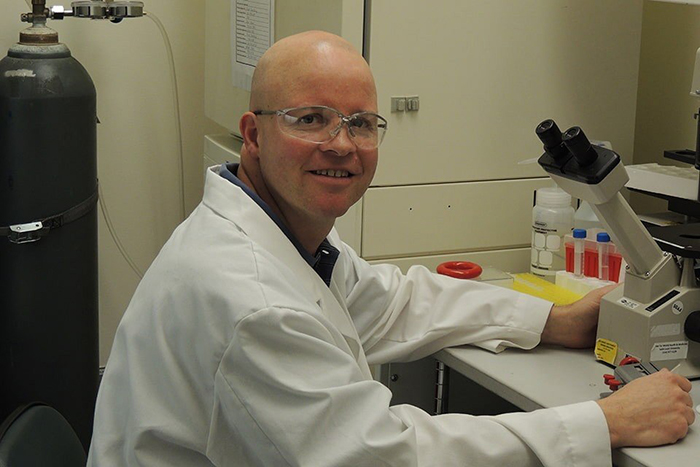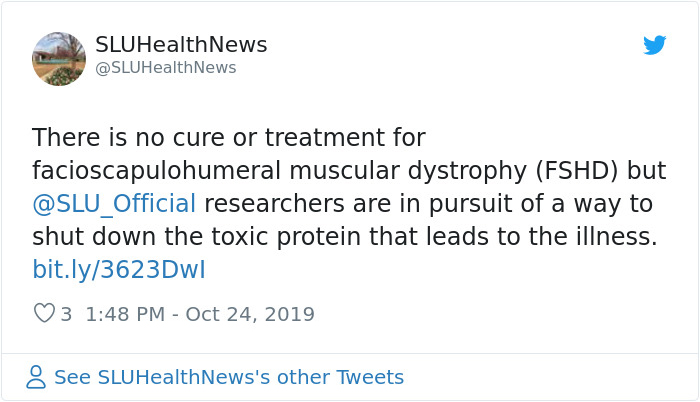
This Scientist’s Daughter Is Suffering From An Incurable Illness And He May Have Stumbled Upon The Beginning Of A Cure
Facioscapulohumeral muscular dystrophy is an illness that is characterized by muscle weakness and atrophy. It starts with the weakness of the face, shoulders and upper arms and eventually affects nearly all skeletal muscles. As of today, the scientists still have no cure for this disorder, but Fran Sverdrup – associate professor of biochemistry and molecular biology at Saint Louis University – is hoping he’s on the verge of finding it.
The findings that bring hope to many of those who suffer from the disease – including Fran’s daughter – was published this October in the Journal of Pharmacology and Experimental Therapeutics. According to the paper, Fran and his team have successfully halted the expression of the culprit protein in cell and animal models.
More info: Saint Louis University | ASPET Journals
This man’s daughter has FSHD, so he is determined to find a cure and is on his way to do so
Image credits: Saint Louis University
Fran has a daughter who was diagnosed with this uncurable illness, therefore he was determined to find a cure for it. As the new findings by him and his team suggest a way forward in developing the first treatment or cure for FSHD, he is even more encouraged than ever before.
“We have been working to find a safe drug that would ‘turn off’ the toxic gene that causes FSHD,” he told the media. “Now we have demonstrated that we can do this in an animal model with a drug that can be taken in pill form.”
In normal skeletal muscle, the DUX4 gene is silenced, whereas, in people with FSHD, the misexpression of this gene leads to cell death and muscle degeneration. Scientists have been looking for a way to prevent the gene’s expression thus halting or at least reverting the course of the disease. Fran’s team recently found out that this can be done by repurposing an already existing drug – a clinically advanced p38 inhibitor, which suppresses toxic DUX4 expression in cell and animal models.
The Saint Louis University Health News announced the findings on Twitter
In addition to this, a biopharmaceutical company has begun a clinical trial of the p38 inhibitor losmapimod in patients, this way testing the newly found approach further. Hopefully, the tests are going to be successful and the cure will soon be available for those who need it.
Here’s what people online thought
7Kviews
Share on FacebookYet many countries cut down budgets for research, particular fundamental research, and threaten the freedom of science. Including the so called Western world, where routinely the defense budgets are higher than the education ones. How much suffering could be stopped with more research and better education?
Hope this turns out well! Bless you and your brilliant mind and your lovely young woman of a daughter she lucky to have such an amazing father. Sending all my love! ;)
Yet many countries cut down budgets for research, particular fundamental research, and threaten the freedom of science. Including the so called Western world, where routinely the defense budgets are higher than the education ones. How much suffering could be stopped with more research and better education?
Hope this turns out well! Bless you and your brilliant mind and your lovely young woman of a daughter she lucky to have such an amazing father. Sending all my love! ;)













86
11